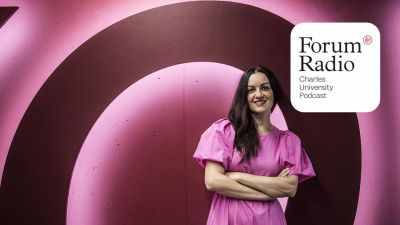It has to be said that Kamila Kopřivová has followed an unusual path: after completing her Ph. D. in Jewish Studies at the Hussite Theological Faculty, Kamila set out to become the first Czech female rabbi. Her journey is almost complete: she is due to be ordained next year. Kamila Kopřivová's studies took her to Berlin and Jerusalem, with occasional stops in the UK and the United States. She has taken part in numerous events as a "rabbi in training", which is also her catchy username on twitter. Kamila Kopřivová has given lectures on numerous topics including for eg. vegetarianism in Judaism. She was a long-time contributor at CU’s own Forum Magazine.

Kamila Kopřivová - set to become the Czechs' first female rabbi - at the fantastic Libeň Synagogue. September 2022. Portrait by Vladimír Šigut.
Excerpts from our interview:
Childhood
“When I was about 10 years old I got a children’s bible as a present from my parents. And I remember my mum standing over me saying ‘You can read it but don’t believe it!’ And this was the primary question that got me interested in religion because I still carry this question with me. I don’t really know why I should not believe in it, I became very interested in learning what “it” was and I am still on that journey.”
The difference a single book can make
“What got me interested in Judaism were Martin Buber’s Tales of the Hasidim when I was 16 that I got from a teacher. I was fascinated by these stories of very pious religious men that used to live in Poland. I just found the book amazing and I fell in love with it. I think that at the time I was sure that I knew everything about Judaism but obviously had no idea, no clue, it was just a fascination with something that I found different. My studies later of course helped me to have a much better understanding and to delve deeper.”
Beginning studies at the Hussite theological faculty
“The thing they tell you right at the start is that you have to learn many languages. It wasn’t just Hebrew. As part of theology studies we had to learn Old Greek and Latin, as well as Old Hebrew, New Hebrew and Aramaic. You have to be talented at languages and I think this was the hardest part of my studies: you have to sit for many, many hours at your desk and just learn.” [Kamila Kopřivová also speaks fluent English, as you can hear in the podcast, and German to boot – ed. note]
The decision to convert
“I began my studies as an atheist and I wanted to be a scientist in the Humanities. I did not consider joining any religion at the beginning. But during my studies I attended a few services within the Prague progressive community and I got more involved and it was kind of a natural process. We used to say that those who started at the faculty with faith, lost it, and those who started without, gained it. That was absolutely [my case].”
On studying the Talmud and other ancient texts in Israel
“You have to go to Israel to experience learning there because it is very different from what you experience at a German or Czech university. In a yeshiva, you are given a text to study with your study partner. You engage with texts daily in a special way. You find a study partner for essentially the whole year and you study and sit together over traditional religious texts, say, for three hours at a time. And the teacher might give you some questions you have to solve. You have to translate for example from Aramaic and sometimes the answers are counter-intuitive. Or, you know them in advance but have to work out how a certain conclusion was determined. And this is very important. To learn this way is very different from how you would learn in Prague [or anywhere else].”

On Czech twitter, where she has almost 8,000 followers, Kamila Kopřivová is known as @rabinkavzacviku: rabbi in training.
A year in Israel
“It was life-changing. You enjoy living there with the people who are your ‘own’ people in a way. Because suddenly you are not in a minority anymore. Everybody knows what holiday is coming up, what you need to buy, or that Sabbath is coming up. You can get what you need at any corner shop. During Sabbath nobody bothers you and everything just stops.”
Jerusalem during Covid
I don’t want to say I was ‘lucky’ but I arrived when the country was locked down. I experienced the old city empty and that was impressive, and beautiful and scary in a way. I came to the Western Wall and there were only a handful of people. I will never get to see anything like this again. Then I went to the Church of the Holy Sepulchre because I wanted to see it. There was no line of people waiting to see the grave of Christ. There was no one.”
In the desert
“The desert was my favourite part by far. Really, it was breathtaking. I was in Negev and the silence… is deafening. There is nothing like it.”
|
|
|
Kamila Kopřivová grew interested in religion already in childhood, after receiving Bible stories from her parents. Much later, she completed her Masters as well as Ph. D. in Jewish Studies at the Hussite Theological Faculty at Charles University. Deciding not to pursue a career in academia, Kamila opted to complete rabbinical studies and to become the first Czech female rabbi. She is due to be ordained next year. Kopřivová's studies have taken her to Berlin, Jerusalem, New York and other major cities. She worked with communities in Austria and Germany. On twitter, she is known as rabínka v zácviku, where she has just under 8,000 followers. For four years, Kopřivová was a key contributor to Forum Magazine at Charles University. One of her final pieces before completing her doctoral thesis was a key interview later re-published by Forum partner Věda a Výzkum.cz. She also interviewed Tomáš Halík and other top thinkers and scientists. |























